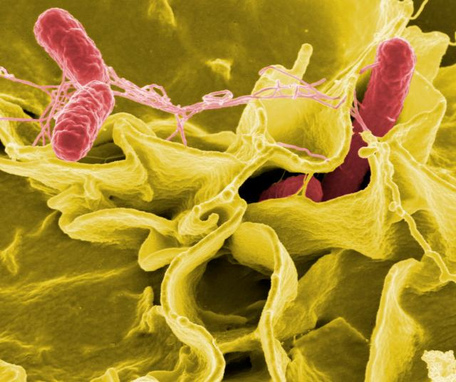 There are billions upon billions of microbial inhabitants living in your yard’s soil, and a lion’s share of that population comprises bacteria and fungi. Those terms often illicit a negative reaction from us– they make us think of diseases and moldy food. So what about the bacteria in our soil? Can it make us sick or cause diseases? Well, according to University of Purdue agronomy professor Ron Turco, the answer is most likely no. “Most of the bacteria in soil can’t directly cause disease, as they don’t have the necessary biochemical abilities,” Dr. Turco recently said in a Q&A for the Soil Science Society of America. In fact, for soil to be healthy, it needs a lot of bacteria, and it needs a wide variety of bacteria (and fungi and nemotodes, etc.) Dr Turco goes on to explain the diversity of microbial life found in healthy yards. It’s estimated that the number of bacteria in soil is more than 100 million per gram of soil (dry weight equivalent); we also estimate there are 6,000 to 8,000 different types of bacteria per gram of soil. More surprising is the fact that the structure of the population can vary in the landscape over relatively short distances. While many bacteria are technically mobile, in soil they are more likely found attached to the soil surface, and most of their movement is controlled by the water flowing through soil pores. Soil bacteria live in small clumps called micro-colonies that are attached to the soil surface. These micro-colonies tend to be associated with small soil aggregates, and the combination offers a form of protection from drying and predators (primarily protozoa). It also enhances the opportunity for genetic exchange. So what does that bacteria actually contribute to the soil? Why does healthy soil need all this life? Dr Turco explains that too. Soil microorganisms are responsible for breaking down plant residues and other carbon (C) inputs [fertilizers] and converting nitrogen (N) within the N-cycle. Because of their soil surface attachment strategy, their actions are also a fundamental part of the soil formation process. In terms of activity and what soil bacteria are doing most of the time, we find that they are often “resting.” That’s because the large, bacterial population uses up the available nutrients quickly and then spends most of its time waiting for new food to arrive: residue inputs, fertilizers, waste materials, etc. Ambient water and temperature conditions also have a major impact on the actions of the bacteria; they are the most negatively affected by low water availability and high temperatures. In general, the ideal conditions for plant growth are also the ideal conditions for microbial activity. And the diversity? Why do we need lots of different kinds of bacteria? The critical point is that the soil doesn’t contain just one type of bacteria or one set of abilities (enzymes). It’s also not full of pathogens, nor are all the bacteria in soil active all the time. Instead, soil activity changes with fluxes in moisture, temperature, and substrate input. In order to respond to an ever-changing array of inputs, the soil biology is biochemically (enzymatically) diverse in its ability to utilize foods and electron acceptors. This diversity gives soil its resilience. It’s critical for your soil to have a variety of microbes living in it. A strong microorganism population also attracts macroorganisms– things like beetles, earthworms, centipedes, etc– which benefit your soil (and plants) as well. So if you’re looking to give your soil a microbial boost– whether for your lawn or garden– Good Sweet Earth Worm Tea is a great place to start. Our Worm Tea, applied as a microbial drench or foliar spray, can introduce a variety of beneficial microbes to your lawn or garden. We brew our Worm Tea with a blend of collected rain water and aquifer water, organic black strap molasses, kelp and our own all-natural vermicompost. We sell it by the gallon for gardeners, CSA shares for growers needing a bit more, and we can also apply a Worm Tea drench directly to your lawn several times a year to give your grass a boost. If you’re interested in giving your soil an infusion of life, get in touch with us about our Worm Tea at office@GoodSweetEarth.com or call us at 616-594-0693.
0 Comments
Your comment will be posted after it is approved.
Leave a Reply. |
